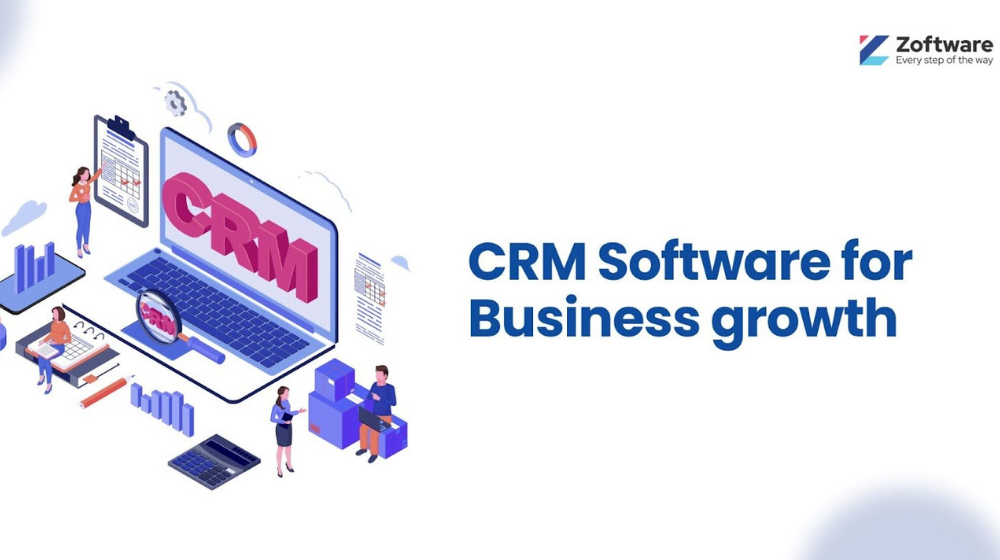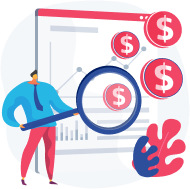By 2025, revenues in the CRM software market, currently the world’s largest, are expected to exceed $80 billion, continuing its growth trend.
This result shows the high demand for CRM software, as it helps businesses improve their performance and growth. CRM software deals with customer relationships, which is essential for every business.
If you are running a business and struggling to manage customers, you should understand how CRM helps businesses grow and how it improves business performance. In this blog, you will learn about it. But before that, let’s know what a CRM is.
What is (CRM) Customer Relationship Management?
Customer Relationship Management (CRM) represents a strategic methodology that combines business operations, technological solutions, and human resource efforts to effectively identify, secure, and maintain customer relationships, ensuring mutual advantages for the company and its clientele.
This approach encompasses an all-encompassing system that oversees a company’s engagements with existing and prospective customers. CRM utilities facilitate the handling of customer information, the simplification of operational processes, and the improvement of interactions in customer service.
To understand CRM in detail, let’s explore its key components and importance of CRM.
Key components of CRM
- Data Management: CRM platforms collect customer-related data from multiple contact points. It includes contact information, transaction records, preferences, and customer feedback. By centralizing this information, CRM allows you to create a detailed customer profile, facilitating interactions tailored to individual needs.
- Tracking Customer Engagements: CRM systems record every customer interaction, be it through emails, phone conversations, or in-person meetings. This information access across customer-facing staff ensures consistent and well-informed customer support.
- Sales Process Oversight: CRM applications are crucial in overseeing the entire sales journey, from the initial lead generation to finalizing deals. They are instrumental in monitoring sales activities, projecting future sales, and dissecting sales trends to refine and enhance sales approaches.
- Integration with Marketing: CRM solutions seamlessly integrate with marketing platforms, automating and keeping track of marketing initiatives. This integration is critical in pinpointing the appropriate target audience, managing marketing resources more effectively, and evaluating the success of marketing campaigns.
- Customer Service and Support Enhancement: CRM contributes significantly to customer service efficiency by ensuring swift access to customer data, thereby speeding up customer issues and inquiries resolution. This efficiency boosts customer satisfaction and fosters loyalty
- Analytics and Insight Generation: CRM systems have analytical tools designed to scrutinize customer data and extract valuable insights. These insights are pivotal in understanding customer behaviors, spotting emerging trends, and guiding data-driven decision-making processes.
Importance of CRM:
CRM software management is essential to understand customer management and enhance overall business performance and growth. The key components of CRM explain its features and how it can solve particular problems.
CRM software management focuses on different aspects of business performance. Aspects like Sales Efficiency, Revenue Growth, Enhanced Marketing Effectiveness, Improved Customer Service, and many more. All these aspects boost overall business growth, too.
Let’s understand the importance of CRM in detail by understanding how it helps businesses grow and its impact on various aspects of business performance.
How CRM helps business to grow
- Improved Customer Relationships:
- Personalized Interactions: CRM systems store detailed customer information, allowing businesses to tailor their interactions based on customer preferences, history, and behavior.
- Consistent Communication: By tracking all customer interactions, CRM ensures that communication is constant and informed, which helps build more robust, more trusting relationships.
- Enhanced Sales Management:
- Streamlined Sales Processes: CRM tools help organize and manage the sales pipeline, making tracking opportunities and closing deals easier.
- Increased Sales Productivity: Automating routine tasks and centralizing customer information saves sales teams time, allowing them to focus on selling rather than administrative tasks.
- Efficient Marketing:
- Targeted Campaigns: Businesses can create more targeted and effective marketing campaigns with access to detailed customer data.
- ROI Measurement: CRM systems enable tracking of marketing campaigns, helping businesses understand what works and where to allocate resources.
- Data-Driven Decision Making:
- Insightful Analytics: CRM analytics provide deep insights into customer behavior, sales trends, and overall business performance.
- Informed Strategies: These insights help in decision-making, such as product development, marketing strategies, and sales tactics.
- Improved Customer Service:
- Quick Resolution of Issues: Access to comprehensive customer data allows your customer service teams to resolve issues and answer queries more efficiently.
- Enhanced Customer Experience: A CRM system can provide a more responsive and personalized customer service experience.
- Increased Efficiency and Productivity:
- Automation of Tasks: CRM systems automate various administrative tasks, reducing employee workload and minimizing errors.
- Collaboration Across Departments: CRM systems can integrate with other tools and provide a platform for different departments to collaborate effectively.
- Scalability:
- Adapts to Growth: CRM systems can scale with the business, accommodating more customers and complex sales processes.
- Supports Expansion: As businesses grow, CRM systems can help manage and maintain the growing customer base and business operations.
- Customer Retention and Loyalty:
- Follow-up and Engagement: CRM systems help track customer engagement and follow-ups, which is crucial for customer retention.
- Loyalty Programs Management: Businesses can manage loyalty programs more effectively using CRM data, encouraging repeat business.
- Reduced Costs:
- Efficiency Gains: CRM systems can help reduce operational costs by automating processes and centralizing information.
- Strategic Resource Allocation: Insights from CRM can guide more efficient allocation of resources, avoiding wasteful spending.
Now, you will understand how CRM effectively helps businesses grow. Despite the nature and size of your business, CRM is also beneficial for small businesses. Many tailored CRM software solutions cater to small businesses’ requirements, too.
Small business owners should understand that CRM works differently for small businesses. They don’t need to focus on a wide range of customers, but it doesn’t mean the efforts are less. Let’s understand how to use CRM for small businesses. Here’s a step-by-step guide for you:
How to use CRM for small business
Choose the Right CRM Software:
- Assess Your Needs: Identify what you need from a CRM based on your business size, industry, customer base, and specific goals.
- Budget Consideration: Find a CRM that fits your budget. Many CRMs offer scalable plans suitable for small businesses.
- Ease of Use: Opt for a user-friendly CRM that your team can quickly adapt to without extensive training.
Implement the CRM System:
- Customize to Fit Your Business: Tailor the CRM to match your business processes, sales pipeline, and customer interaction styles.
- Data Migration: Import existing customer data into the CRM. Ensure data accuracy and completeness during this process.
Train Your Team:
- Comprehensive Training: Ensure all CRM team members are trained to use it effectively.
- Ongoing Support: Provide resources for continuing learning and troubleshooting.
Integrate CRM with Other Tools:
- Software Integration: Integrate the CRM with other tools your business uses, such as email platforms, social media, accounting software, etc., for a seamless workflow.
Data Management and Organization:
- Regular Data Entry: Encourage consistent and timely data entry to keep customer records up-to-date.
- Data Analysis: Use CRM data to gain insights into customer behavior, sales trends, and marketing campaign effectiveness.
Leverage CRM for Marketing:
- Targeted Campaigns: Use customer data to create targeted marketing campaigns.
- Track Campaign Performance: Monitor the effectiveness of marketing efforts directly through the CRM.
Enhance Customer Service:
- Centralized Information: Use the CRM to store all customer interactions, providing a comprehensive view to enhance customer service.
- Automate Responses: Set up automated responses for common customer inquiries.
Monitor Sales Processes:
- Track Sales Activities: Use the CRM to track sales calls, meetings, and outcomes.
- Sales Forecasting: Utilize CRM tools for forecasting sales and setting realistic targets.
Regularly Review and Adapt:
- Feedback Loop: Regularly solicit feedback from your team on the CRM’s effectiveness and areas for improvement.
- Adapt and Evolve: Continuously refine how you use the CRM as your business grows and changes.
Ensure Compliance and Security:
- Data Protection: Ensure your CRM complies with data protection laws relevant to your region (like GDPR).
- Regular Updates: Keep the CRM software updated to ensure data security and access to new features.
Significant impact on various aspects of business performance
How CRM software helps in business performance is explained by stating its impact on its various aspects given below:
Sales Efficiency and Revenue Growth:
- Streamlined Sales Processes: CRM helps organize and manage the sales pipeline more efficiently, reducing the sales cycle and increasing closing rates.
- Upselling and Cross-Selling Opportunities: With detailed customer information, businesses can identify opportunities for upselling and cross-selling, thereby increasing revenue.
Enhanced Marketing Effectiveness:
- Targeted Marketing Campaigns: CRM data enables businesses to segment their customer base and tailor marketing efforts, leading to more effective campaigns.
- Improved Marketing ROI: By tracking and analyzing the outcomes of marketing campaigns, businesses can optimize their marketing spend and strategies for better ROI.
Improved Customer Service and Satisfaction:
- Faster Resolution of Customer Issues: Access to comprehensive customer information allows customer service teams to address issues and queries more quickly and effectively.
- Personalized Customer Interactions: CRM enables businesses to provide customized services and communications, enhancing customer satisfaction and loyalty.
Operational Efficiency:
- Automation of Administrative Tasks: CRM automates routine tasks such as data entry, follow-up reminders, and report generation, freeing employee time for more value-added activities.
- Reduced Operational Costs: Improved efficiency and automation can lead to a reduction in operational costs over time.
Enhanced Internal Communication and Collaboration:
- Centralized Information: With a centralized database, different departments can access the same, up-to-date customer information, improving internal communication.
- Collaborative Working Environment: CRM facilitates collaboration between sales, marketing, and customer service teams, leading to a more cohesive approach to customer management.
Customer Retention and Loyalty:
- Proactive Customer Engagement: CRM helps businesses stay in touch with customers, anticipate their needs, and respond proactively, which is critical to retaining customers.
- Loyalty Program Management: Businesses can effectively analyze customer loyalty programs using CRM, encouraging repeat business and referrals.
Conclusion
With this blog, you will understand how CRM software benefits businesses. Even if your business is small, you should have a suitable CRM software management system to improve your business performance and growth.
But sometimes, finding the best CRM software for your business can be nerve-wracking. As it is an integral part of your business growth, you must be careful while selecting. Well, you do not have to take all the loads on your head. Here, we have a helping hand for you.
Zoftware is a software exploration platform located in the Middle East. This platform streamlines the task of finding suitable CRM software by enabling businesses to outline their needs, evaluate different software choices, and make knowledgeable choices based on authentic user reviews.
Register now to get the best software for your enterprise.


